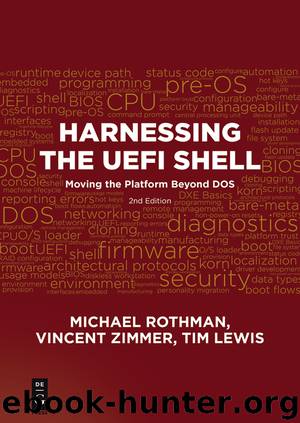Harnessing the UEFI Shell by Michael Rothman Vincent Zimmer Tim Lewis

Author:Michael Rothman,Vincent Zimmer,Tim Lewis [Неизв.]
Language: eng
Format: epub
Publisher: De Gruyter
Published: 2017-08-23T21:00:00+00:00
Loading and Unloading UEFI Drivers
Two UEFI Shell commands are available to load and start UEFI drivers, Load and LoadPciRom. The UEFI Shell command that can be used to unload a UEFI driver if it is unloadable is Unload.
Load
The Load command loads a UEFI driver from a file. UEFI driver files typically have an extension of . efi. This command has one important option, the -nc (“No Connect”) option, for UEFI driver developers. When the Load command is used without the -nc option, the loaded driver is automatically connected to any devices in the system that it is able to manage. This means that the UEFI driver’s entry point is executed and then the EFI Boot Service ConnectController() is called. If the UEFI driver produces the Driver Binding Protocol in the driver’s entry point, then the ConnectController() call exercises the Supported() and Start() services of Driver Binding Protocol that was produced.
If the -nc option is used with the Load command, then this automatic connect operation is not performed. Instead, only the UEFI driver’s entry point is executed. When the -nc option is used, the UEFI Shell command Connect can be used to connect the UEFI driver to any devices in the system that it is able to manage. The Load command can also take wild cards, so multiple UEFI drivers can be loaded at the same time.
The following are some examples of the Load command.
Example 1 loads and does not connect the UEFI driver image EfiDriver.efi. This example exercises only the UEFI driver’s entry point:
fs0:> Load -nc EfiDriver.efi
Example 2 loads and connects the UEFI driver image called EfiDriver.efi. This example exercises the UEFI driver’s entry point and the Supported() and Start() functions of the Driver Binding Protocol:
fs0:> Load EfiDriver.efi
Example 3 loads and connects all the UEFI drivers with an .efi extension from fs0:, exercising the UEFI driver entry points and their Supported() and Start() functions of the Driver Binding Protocol:
fs0:> Load *.efi
Download
This site does not store any files on its server. We only index and link to content provided by other sites. Please contact the content providers to delete copyright contents if any and email us, we'll remove relevant links or contents immediately.
| Coding Theory | Localization |
| Logic | Object-Oriented Design |
| Performance Optimization | Quality Control |
| Reengineering | Robohelp |
| Software Development | Software Reuse |
| Structured Design | Testing |
| Tools | UML |
The Mikado Method by Ola Ellnestam Daniel Brolund(22540)
Hello! Python by Anthony Briggs(21721)
Secrets of the JavaScript Ninja by John Resig Bear Bibeault(20296)
Dependency Injection in .NET by Mark Seemann(19635)
The Well-Grounded Java Developer by Benjamin J. Evans Martijn Verburg(19403)
Kotlin in Action by Dmitry Jemerov(19348)
OCA Java SE 8 Programmer I Certification Guide by Mala Gupta(18840)
Algorithms of the Intelligent Web by Haralambos Marmanis;Dmitry Babenko(17650)
Adobe Camera Raw For Digital Photographers Only by Rob Sheppard(16968)
Grails in Action by Glen Smith Peter Ledbrook(16798)
Test-Driven iOS Development with Swift 4 by Dominik Hauser(10947)
Becoming a Dynamics 365 Finance and Supply Chain Solution Architect by Brent Dawson(8069)
Microservices with Go by Alexander Shuiskov(7834)
Practical Design Patterns for Java Developers by Miroslav Wengner(7732)
Test Automation Engineering Handbook by Manikandan Sambamurthy(7695)
Angular Projects - Third Edition by Aristeidis Bampakos(7178)
The Art of Crafting User Stories by The Art of Crafting User Stories(6627)
NetSuite for Consultants - Second Edition by Peter Ries(6546)
Demystifying Cryptography with OpenSSL 3.0 by Alexei Khlebnikov(6324)
